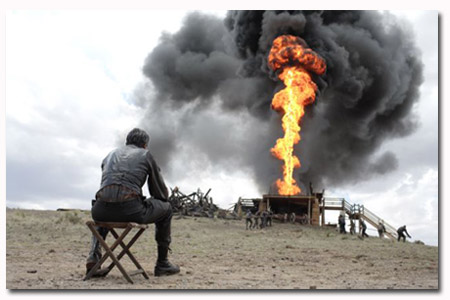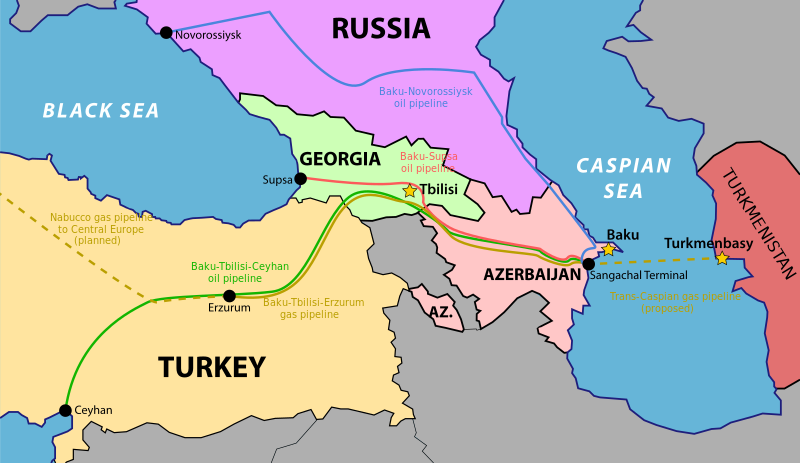So with the ongoing war in Georgia, it is important to figure out how all of this impacts the world and what are the prime motivations of Russia. It is clear to me now that Russia had no intention of sticking with just protecting rebels in Georgia. I think the overall motivation was to take control of Georgia and the pipelines running through it and to keep Georgia out of NATO. And I think Russia has done that. I do not see NATO or the US going in to fight off Russia and stopping their plans of controlling Georgia either.
But back to the impact of all of this. So far the oil markets have not reacted too severely. The BTC pipeline pumps about a million barrels a day to the west and so far the only damage to the pipeline has been in Turkey by the PKK(is there a connection?). But in Georgia, I think Russia has no intention of damaging this cash cow that they are trying to seize. So with this said, I believe if that this conflict becomes protracted, then you will see a constant attack on this pipeline by Georgian forces. The idea being that if the oil means so much to Russia, then that is how you hurt Russia.
The other impact of this is that if there is instability with the Caspian Sea related oil supplies, then other supply sources will become more important to the West. Most importantly, who will Europe turn to for oil in the future? Will they deal with Russia, who would have a control on price and supply coming from this region, or will Europe look elsewhere? I almost think Europe has to deal with Russia more than ever, until infrastructure and other oil deals and sources are found and secured. Like the articles talk about below, the west was depending on this pipeline as a way to bypass dealing with Russia. And given the fact that Europe is already hurting bad with fuel costs, and the coming winter heating costs, this could be bad for them.
And with the other break away republics looking on, I think they are extremely nervous that they will be next in the coming years. Which leads you to think, when will NATO and the west eventually have to step in? Or will we? What is the message that the West is sending to these republics, by doing nothing? We supported their democracies and breaking away from mother Russia, but now, what faith would they have in us when we stand by and do nothing while Russia violently takes over Georgia? And do we want to risk an all out war with Russia over such a thing?
To me, it always boils down to oil, and any threats to that oil supply will dictate our actions. That is the reality. With these countries that have oil or have a pipeline, we will always do what we can to protect them and insure that they do business with us and keep that flow going. I look at oil, as the life blood of the world, and it is absolutely essential to secure supplies for our thriving economies. There is no alternative right now, that will even come close to replacing oil. Biodiesel, ethanol, all of it will not be able to replace oil in the time frame that we need it too. Until some incredible advancements in science is able to turn water into oil or something, we are stuck playing the Great Energy Game. Just my thoughts on the matter, and I think Russia is thinking the same way too.
And with Russia controlling a larger percent of that oil, now that they have control of Georgia, then that gives them more power at the negotiating tables of the world. To me, that is what is really at stake. And Russia wants to make a lot of money and they want more power and influence. So with that said, the economic landscape has just changed with Russia’s latest move and only time will tell how Russia wields their increased influence in the region. –Head Jundi

Photo from the movie “There Will Be Blood”
Georgia: Russians close off strategic Georgian port
Deal to transform Black Sea port of Poti could lie in ruins as Russians seal off access
By Christopher Hope
Last Updated: 6:21PM BST 11 Aug 2008
Just five months ago, Georgia’s President Mikhail Saakashvili was touting a $70million deal which he hoped would transform the Black Sea port of Poti, creating 20,000 jobs over the next five years.
Under the deal Arab investors were set to plough $200million into developing a new port alongside the existing commercial port, trebling Poti’s capacity to 25 million tonnes of cargo a year.
Now those plans could lie in ruins as the port has been cut off by advancing Russian troops. The 51,000 inhabitants of Poti will not remember the port’s 150th anniversary with any affection.
Russia’s over-running of Senaki, a town 25 miles inland from Poti, has effectively shut down the country’s biggest commercial port.
The move will, officials say, starve the country of more than half of its imports of key products like wheat, grain, tinned food and cars.
Giorgi Badrdidze, the acting head of mission at the Georgian Embassy in London, said: “Poti is a vital lifeline for Georgia and Tbilisi because it offers a direct connection to western countries.
“This is a major, strategically important economic target. It imports a huge part of the Caucuses’ agricultural products.”
Independent experts said that the blockade of Poti would be felt across the regions as products shipped through the Black Sea port feed neighbouring countries Armenia and Azerbaijan.
John Roberts, from energy consultants Platts who has written a report on the port Poti, said: “Poti is very important as a commerical port, with an important ferry service to Romania. It is Georgia’s window on the world.”
Mr Roberts said the cutting off of Poti would particularly hit the oil industry in neighbouring Azerbaijan, which relies heavily on drilling equipment shipped through the port. He said: “Poti is one of Azerbaijan’s lungs.”
Much of the freight which would have come through the port will have to be diverted through Georgia’s other main port to the south, Batumi, or come via road or rail through Armenia.
Mr Roberts said that while Georgia was more self-sufficient than its neighbours for basic food stuffs “all the luxuries will go in short supply”.
Energy shares were yesterday buoyed by worries over oil supplies, with gas producer Gazprom surging 6pc and oil producer Lukoil rising 4pc.
In early trading, the MICEX fell as much as 6pc to its lowest level since September 2006 and the RTS fell around 5pc to its lowest level since November 2006.
“Given Russia’s overwhelming military advantage, we would expect any potential combat to be short-lived, with the two sides back at the negotiation table in a matter of days or weeks,” Dresdner Kleinwort analysts said in a research note.

Energy August 11, 2008, 3:32PM EST text size: TT
A Roadblock to Russian Oil and Gas
The assault on Georgia delivers a sharp setback to a proposed U.S.-backed route to the West
by Steve LeVine
The Russian assault on Georgia has injected a specter of doubt into a U.S.-backed oil and natural gas route that had until now seemed safer than almost any other on which the West relies, analysts say.
Washington has spent more than a decade of diplomacy and arm-twisting to erect what it calls an East-West Energy Corridor connecting the countries of the Caspian Sea with NATO ally Turkey. The result has been a network of oil and natural gas pipelines, ports, and tankers that can feed a million barrels a day to the world market. Washington has sought to expand and link that network directly to Europe, where Russia is currently the dominant supplier.
But Russia’s vigorous assault on Georgia—a key stretch of the energy route—has made the strategy seem less reliable, analysts say. Black Sea oil tankers that normally would be filling up with Baku crude, for example, were reported on Aug. 11 to be anchoring 15 miles offshore from the Georgian port of Batumi, where there was a rumor of a bombing by Russia.
Not So Safe Anymore
“What was thought to be a safe transit route doesn’t look as safe as a few weeks ago,” says Edward Chow, an energy expert at Washington’s Center for Strategic & International Studies. “And the anxiety is not likely to dissipate when the crisis ends.”
In the mid-1990s, the Clinton Administration devised the energy corridor as a way to turn the Russian-dominated Caucasus and Central Asia into a financially independent, pro-Western region. This was long before there was recognition of a looming energy shortage, so the fact that the region would also deliver large volumes of oil and natural gas to market was regarded as icing on the cake.
Central to the policy was construction of the 1,000-mile Baku-Ceyhan oil pipeline connecting the capital of Azerbaijan with the Mediterranean Sea. Georgia is a crossover point for the Baku-Ceyhan oil pipeline, its companion natural gas line, and a smaller oil line called Baku-Supsa.
Baku-Ceyhan began working two years ago. A blast on the Turkish section of the line last week raised questions about its security. A Kurdish separatist group claimed responsibility for the blast, which may keep the line down another week until it is repaired.
Russia Defends Its Backyard
From the outset, Russia was highly critical of U.S. efforts to reduce Russia’s influence in what it regards as its own backyard. And the assault on Georgia appeared to be at least in part an attempt to draw an end to the time of a pro-Western slant in the Caucasus and Central Asia.
Does that also mean an end to the West’s challenge to Russia’s regional energy power?
The short answer may be no. All the current lines will continue to operate. Russia won’t interfere with them directly, analysts say. Its larger economic-political strategy of cementing its dominance of Europe’s energy supply depends on not spooking the Europeans, who could then be encouraged to back the construction of more non-Russian energy pipelines, and thus dilute Russian power.
But an expansion of Western influence—proposed trans-Caspian oil and natural gas lines from Turkmenistan or Kazakhstan, and a proposed natural gas line from Turkmenistan to Europe called Nabucco—may now be effectively dead. No Caspian President would gamble his survival by embracing such a project, analysts say.
“A new Iron Curtain is descending around the periphery of Russia. Any chance of a new non-Russian pipeline out of Central Asia and into Europe is pretty much dead,” says Chris Ruppel, an energy analyst at Execution, a Greenwich (Conn.) brokerage. “Russia has demonstrated that its military is a force to reckon with, that it can defeat a Western-trained force, and that the West and NATO will not act to intervene.”
LeVine is a correspondent in BusinessWeek’s Washington bureau.
Story Here